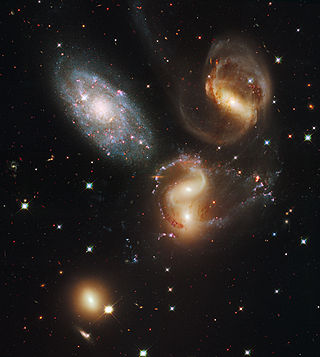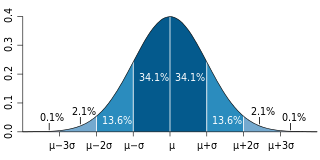Metaphysics is the branch of philosophy that studies the fundamental nature of reality. This includes studies of the first principles of: being or existence, identity, change, consciousness, space and time, necessity, actuality, and possibility. It can also include questions about the existence of God, as well as relationships between foundational philosophical ideas such as between mind and matter, cause and effect, substance and attribute, or potentiality and actuality.
In metaphilosophy and ethics, metaethics is the study of the nature, scope, and meaning of moral judgment. It is one of the three branches of ethics generally studied by philosophers, the others being normative ethics and applied ethics.
Materialism is a form of philosophical monism which holds that matter is the fundamental substance in nature, and that all things, including mental states and consciousness, are results of material interactions of material things. According to philosophical materialism, mind and consciousness are by-products or epiphenomena of material processes, without which they cannot exist. Materialism directly contrasts with idealism, according to which consciousness is the fundamental substance of nature.
The following outline is provided as an overview of and topical guide to physics:

Reality is the sum or aggregate of all that is real or existent within the universe, as opposed to that which is only imaginary, nonexistent or nonactual. The term is also used to refer to the ontological status of things, indicating their existence. In physical terms, reality is the totality of a system, known and unknown.

Determinism is the philosophical view that all events in the universe, including human decisions and actions, are causally inevitable. Deterministic theories throughout the history of philosophy have developed from diverse and sometimes overlapping motives and considerations. Like eternalism, determinism focuses on particular events rather than the future as a concept. The opposite of determinism is indeterminism, or the view that events are not deterministically caused but rather occur due to chance. Determinism is often contrasted with free will, although some philosophers claim that the two are compatible.
Relativism is a family of philosophical views which deny claims to objectivity within a particular domain and assert that valuations in that domain are relative to the perspective of an observer or the context in which they are assessed. There are many different forms of relativism, with a great deal of variation in scope and differing degrees of controversy among them. Moral relativism encompasses the differences in moral judgments among people and cultures. Epistemic relativism holds that there are no absolute principles regarding normative belief, justification, or rationality, and that there are only relative ones. Alethic relativism is the doctrine that there are no absolute truths, i.e., that truth is always relative to some particular frame of reference, such as a language or a culture. Some forms of relativism also bear a resemblance to philosophical skepticism. Descriptive relativism seeks to describe the differences among cultures and people without evaluation, while normative relativism evaluates the word truthfulness of views within a given framework.

Donna J. Haraway is an American professor emerita in the history of consciousness and feminist studies departments at the University of California, Santa Cruz, and a prominent scholar in the field of science and technology studies. She has also contributed to the intersection of information technology and feminist theory, and is a leading scholar in contemporary ecofeminism. Her work criticizes anthropocentrism, emphasizes the self-organizing powers of nonhuman processes, and explores dissonant relations between those processes and cultural practices, rethinking sources of ethics.
In philosophy of science and in epistemology, instrumentalism is a methodological view that ideas are useful instruments, and that the worth of an idea is based on how effective it is in explaining and predicting natural phenomena. According to instrumentalists, a successful scientific theory reveals nothing known either true or false about nature's unobservable objects, properties or processes. Scientific theory is merely a tool whereby humans predict observations in a particular domain of nature by formulating laws, which state or summarize regularities, while theories themselves do not reveal supposedly hidden aspects of nature that somehow explain these laws. Instrumentalism is a perspective originally introduced by Pierre Duhem in 1906.
The relationship between Buddhism and science is a subject of contemporary discussion and debate among Buddhists, scientists, and scholars of Buddhism. Historically, Buddhism encompasses many types of beliefs, traditions and practices, so it is difficult to assert any single "Buddhism" in relation to science. Similarly, the issue of what "science" refers to remains a subject of debate, and there is no single view on this issue. Those who compare science with Buddhism may use "science" to refer to "a method of sober and rational investigation" or may refer to specific scientific theories, methods or technologies.

Applied philosophy is a branch of philosophy that studies philosophical problems of practical concern. The topic covers a broad spectrum of issues in environment, medicine, science, engineering, policy, law, politics, economics and education. The term was popularised in 1982 by the founding of the Society for Applied Philosophy by Brenda Almond, and its subsequent journal publication Journal of Applied Philosophy edited by Elizabeth Brake. Methods of applied philosophy are similar to other philosophical methods including questioning, dialectic, critical discussion, rational argument, systematic presentation, thought experiments and logical argumentation.
In common usage, technoscience refers to the entire long-standing and global human activity of technology, combined with the relatively recent scientific method that occurred primarily in Europe during the 17th and 18th centuries. Technoscience is the study of how humans interact with technology using the scientific method. Technoscience thus comprises the history of human application of technology and modern scientific methods, ranging from the early development of basic technologies for hunting, agriculture, or husbandry and all the way through atomic applications, biotechnology, robotics, and computer sciences. This more common and comprehensive usage of the term technoscience can be found in general textbooks and lectures concerning the history of science.
Evolutionary ethics is a field of inquiry that explores how evolutionary theory might bear on our understanding of ethics or morality. The range of issues investigated by evolutionary ethics is quite broad. Supporters of evolutionary ethics have claimed that it has important implications in the fields of descriptive ethics, normative ethics, and metaethics.
This glossary of philosophy is a list of definitions of terms and concepts relevant to philosophy and related disciplines, including logic, ethics, and theology.
Karen Michelle Barad is an American feminist theorist and physicist, known particularly for their theory of agential realism.
Feminist epistemology is an examination of epistemology from a feminist standpoint.
Feminist technoscience is a transdisciplinary branch of science studies which emerged from decades of feminist critique on the way gender and other identity markers are entangled in the combined fields of science and technology. The term technoscience, especially in regard to the field of feminist technoscience studies, seeks to remove the distinction between scientific research and development with applied applications of technology while assuming science is entwined with the common interests of society. As a result, science is suggested to be held to the same level of political and ethical accountability as the technologies which develop from it. Feminist technoscience studies continue to develop new theories on how politics of gender and other identity markers are interconnected to resulting processes of technical change, and power relations of the globalized, material world.
The von Neumann–Wigner interpretation, also described as "consciousness causes collapse", is an interpretation of quantum mechanics in which consciousness is postulated to be necessary for the completion of the process of quantum measurement.
Quantum social science is an emerging field of interdisciplinary research which draws parallels between quantum physics and the social sciences. Although there is no settled consensus on a single approach, a unifying theme is that, while the social sciences have long modelled themselves on mechanistic science, they can learn much from quantum ideas such as complementarity and entanglement. Some authors are motivated by quantum mind theories that the brain, and therefore human interactions, are literally based on quantum processes, while others are more interested in taking advantage of the quantum toolkit to simulate social behaviours which elude classical treatment. Quantum ideas have been particularly influential in psychology but are starting to affect other areas such as international relations and diplomacy in what one 2018 paper called a "quantum turn in the social sciences".
Postqualitative inquiry is a research philosophy proposed by University of Georgia Professor of Education Elizabeth St. Pierre in 2011 that advocates for an intentional deconstructive stance toward concepts within traditional research methods on human subjects, such as interviews, data analysis, and validity. It incorporates ideas from posthumanism, critical theory, poststructuralism, and indigenous research philosophies, emphasizing the use of epistemological and ontological principles to deconstruct and reconstruct assumed knowledge about "the nature of being and human being, language, representation, knowledge, truth, [and] rationality." Postqualitative inquiry does not follow a defined method and methodology but is rather something that "emerges as a process methodology" in the midst of traditional research. It is a direct response to and move away from conventional humanist qualitative research methodology.



